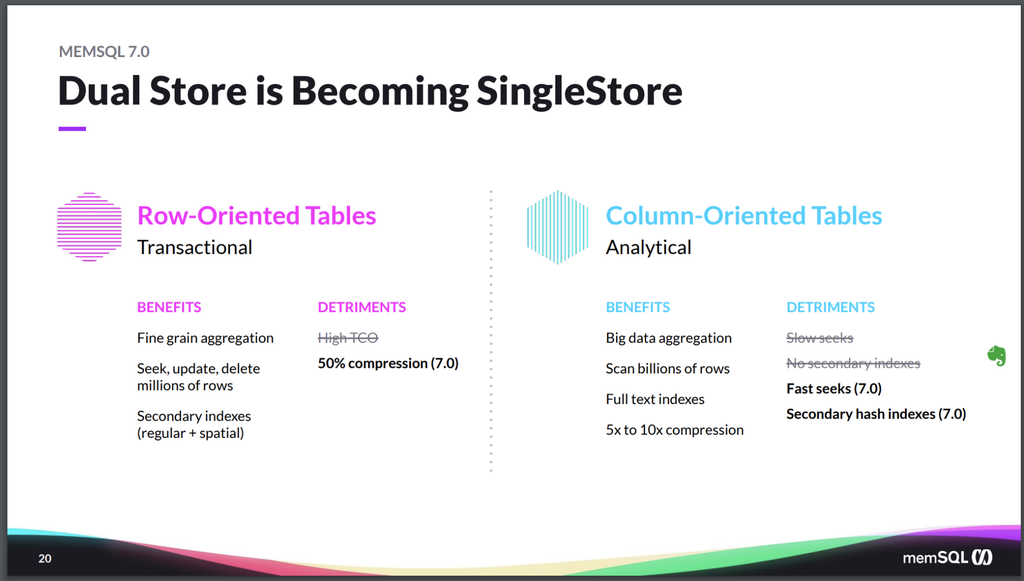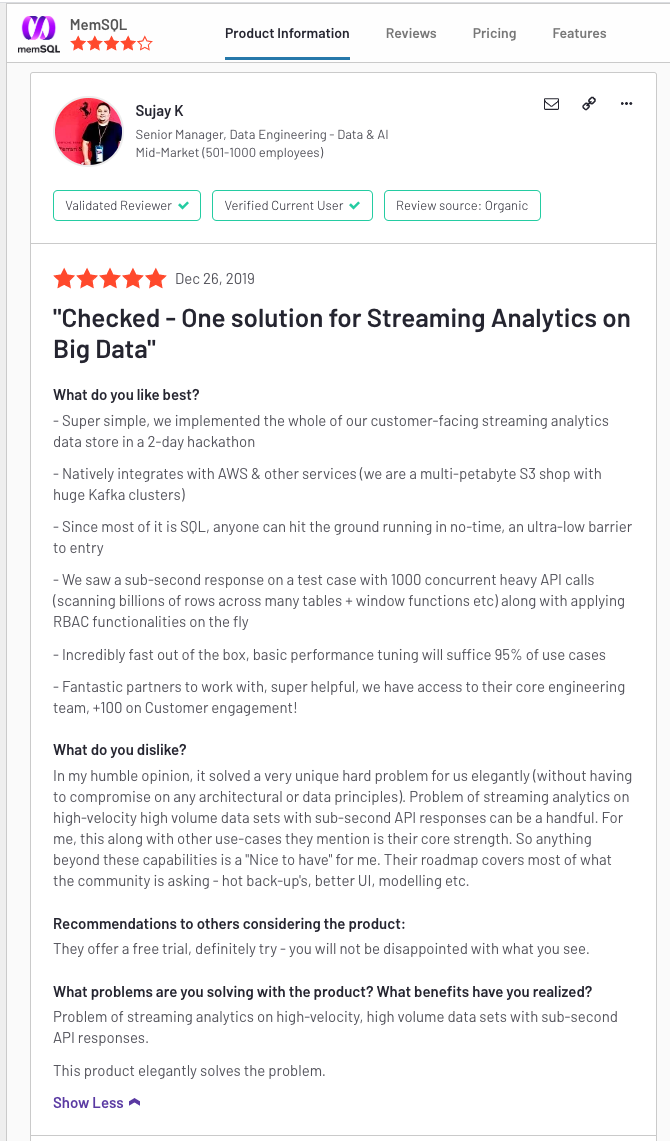
SingleStore is garnering a lot of positive attention on business solutions review site G2.com (formerly known as G2 Crowd). As Walt P, a data engineer at an enterprise company, puts it: “We have loaded data in volumes that have historically stopped other database technologies in their tracks.” Since our look at the site last July, dozens of new reviews have been posted, citing SingleStore’s speed, high capacity, and SQL compatibility, among other features. However, the most recent review was in December; now, some lucky SingleStore user has the chance to register the first comment of the new year. (Also, as most would say, of the new decade, though – as xkcd points out – this is a matter of some controversy.)
G2.com features information and frank user reviews of business solutions – software and services – across a wide range of categories. Software categories include CRM software, demand generation software, BI tools, AI development and delivery tools, marketplace platforms, CAD/CAM tools, and many more. Services categories include lawyers, tax people, sales training, graphic design, website design, staffing services, channel partners, and much more.
It’s easy to link from a product to its overarching category (such as Relational Databases Software, for SingleStore and related software, or to interact with a G2 Advisor, to help you narrow your search with help from a live person. (Not a bot – at least, not last time we checked.) You can quickly share your comments on social media, ask a vendor question, or request a demo from a vendor.
Using G2.com will help you see whether a product is a strong player in the market; assess its strengths and weaknesses; look at the competition; and get ready to answer intelligent questions in a vendor call. Your review comments encourage the vendors of products you use to keep up the good work and to fix any problems.
Note: Be sure to hit the Show More link on G2.com reviews. Otherwise, you might miss comments about recommendations to others, the problems being solved, benefits being realized, and other valuable information.
What SingleStore Users on G2.com Say About SingleStore
The recent comments on G2.com have yielded a star rating of 4 out of a possible 5 points. The major positive areas cited in include speed, capacity, and ease of implementation. (Some of the comments have been lightly edited for spelling, syntax, spelling out acronyms, and so on – the original comments are on the G2 site.)
Speed
The major focus of many comments, and a common thread through nearly all of them, is SingleStore’s speed.
SingleStore achieves its high speed through a distributed, lock-free architecture. New features in SingleStore Universal Storage improve speed further, with smaller data size (equals faster loading times) for rowstore tables, and faster seeks and faster updating, using secondary hash indexes, for columnstore tables.

Comments include:
- “We saw a sub-second response on a test case with 1000 concurrent heavy API calls (scanning billions of rows across many tables + window functions etc) along with applying role-based RBAC functionalities on the fly.” (SingleStore has processed over a trillion rows per second.) “Incredibly fast performance for dashboards!” This was the heading of a five-star review from a VP of IT Operations. They went on, “We have had excellent luck with ingest rates and the ability to do lightning fast counts and other general math on time-based data sets.”
- “We’ve been able to pump through many millions of records in seconds, where in other database systems we were having our queries time out.”
- “I… recommend it for businesses who have issues with data retrieval slowness and are looking to improve data retrieval speeds. We solved slowness in our grid reports by using SingleStore. This reduced the time clients waited for reports to be generated and made their experience much more pleasant.”
- “The best thing about SingleStore is the speed at which queries are run. Add Kafka pipelines for your ETL process and everything data-related becomes much easier.”
- “We handle extremely large data set analysis. SingleStore provides us with the capability to do so at incredible speed!”
- “We, a Big 4 accounting firm, use SingleStore for rapid creation and destruction of clusters. SingleStore’s speed and reliability are key for our use case, since speed is our priority. Not having to keep clusters active saves time and money. SingleStore’s speed enables that competitive advantage.”
- Problem being solved: “Slow queries in MySQL.” Benefits realized: “SingleStore allows us to run all queries, with no limitation, at every scale of data.”
- “Currently the teams are using SingleStore to parse extremely large datasets in times that used to take days.”
Capacity – and “Solving too Many Problems”
What’s truly remarkable about SingleStore is its linear scalability – the ability to maintain high performance, for both transactions and analytics, at high volumes. This includes high ingest volumes, processing large volumes of data, high volumes of queries, and high concurrency – many queries coming from many sources, including ad hoc queries, business intelligence tools, application demands, machine learning models, and more. When people refer to SingleStore’s speed, as in the previous section, they often really mean its ability to maintain very high speeds with very large volumes of data.
A number of the more recent comments on G2.com address this core SingleStore capability:
- “Our primary BI tool is Tableau. Before we implemented SingleStore, we were connecting Tableau to Microsoft SQL Server and running reports off there. However, the performance was extremely slow, especially when querying large chunks of data. With SingleStore, we can query as much data as we need, with little to no impact on performance time.”
- “We replaced the databases of our core operational systems with SingleStore. We mostly go after greater performance and scalability.”
- “Very scalable, fabulous, and very easy to use. I recommend it for the management of the organization’s data.”
- “Great for extreme data processing. For extremely large data mining, SingleStore stands above the rest. The ability to process an extreme amount of data expediently is by far the greatest part of SingleStore.”
- “(We implemented a) data lake with SingleStore. Performance increased multi-fold and scaled for a large volume of data.”
- “We are solving too many problems with the help of SingleStore. Now we can analyze large amounts of data with efficiency.”
Two Sides to Ease of Use, and More
The only major aspect of SingleStore’s capabilities that receives mixed reviews on G2 Crowd is ease of use. Some commenters describe it as very easy to use, and very easy to implement; this is especially true for those who have MySQL experience. (Not only do both databases use SQL, but SingleStore directly supports the MySQL wire protocol for connectivity.) Other commenters describe SingleStore as complicated or taking time to master; “It has some learning curve,” says one.
The commenters are, indeed, talking about the same database. The point here is that, when dealing with large volumes of data, SingleStore eliminates the need to shard your own database, or to buy in a complex and expensive solution such as Oracle Exadata, when capacity demands outstrip what can be handled on a single server. So SingleStore is easy to use, compared to the big-data alternatives. But it’s harder to understand how it works than with some single-server relational databases.
SingleStore is also unusual in its ability to handle both transactions and analytics, while replacing slow and complex extract, transform, and load (ETL) processes with easy-to-use SingleStore Pipelines. Several comments recognize this; “it has potential to be used for both for transaction processing as well analytical queries.”
But a couple of comments seem to reflect a view of SingleStore as an in-memory database (only); “Excellent in-memory option for high-powered data analysis,” says one. SingleStore rowstore tables, used for transactions, do run in memory; but columnstore tables, used for most analytics operations, are disk-based, compressed 5-10x, and very efficient. Most of the comments recognize both sets of capabilities.
This reflects an unusual strength: the ability of SingleStore to perform both transactions and analytics in a single database system. “The same DB system can be used for OLTP and OLAP purpose as well,” says one commenter. And another: “You can seamlessly join across both row and columnar based tables.”
A weakness mentioned for SingleStore in the comments is around centralized performance monitoring. SingleStore does provide SingleStore Studio, which is great for monitoring the health of your cluster and for optimizing queries, but not focused on performance monitoring as such. SingleStore offers an historical monitoring tool, which is currently in beta, for customers with an Enterprise license. Internally, and like many of our customers, we also use Prometheus – an exporter is mentioned here – and Grafana, which are just two of the many monitoring tools that work with SingleStore.
Finally, SingleStoreDB Self-Managed 7.0 includes the first iteration of SingleStore Universal Storage, which will eventually unify rowstore and columnstore tables in a single table type, for most workloads. In SingleStoreDB Self-Managed 7.0, Universal Storage allows for compression of in-memory rowstore tables of about 50%, saving a great deal of money. At the same time, columnstore tables get big performance improvements from first-generation Universal Storage features in the new release.

Summing Up
One comment sums up many of SingleStore’s benefits, well, elegantly. When asked, What benefits have you realized?,” this customer comments: “The problem of running streaming analytics on high-velocity, high volume data sets with sub-second API responses. This product elegantly solves the problem.”
If you’re already a SingleStore user – whether you have an Enterprise license, or are using SingleStore for free – consider posting a review today. (And remember that you can get questions answered on the SingleStore Forums as well.) Your efforts will benefit the community as a whole.
If you haven’t yet tried SingleStore, take a look at the reviews on G2.com. Post questions there, or on the SingleStore Forums. And consider trying SingleStore for free.
SingleStore customers – free users, and Enterprise users: Add your review to G2.com today!












